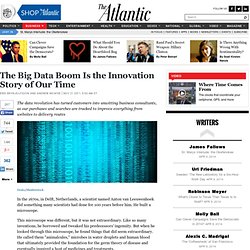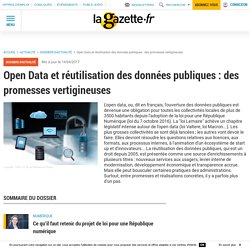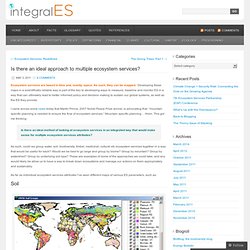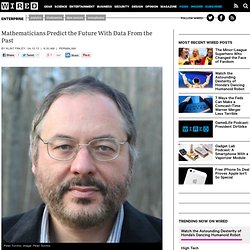

Statistiques pauvreté.
GapMinder. Comprendre. Sources de données statistiques. The Big Data Boom Is the Innovation Story of Our Time - Erik Brynjolfsson and Andrew McAfee - Business. The data revolution has turned customers into unwitting business consultants, as our purchases and searches are tracked to improve everything from websites to delivery routes Dralo/Shutterstock In the 1670s, in Delft, Netherlands, a scientist named Anton van Leeuwenhoek did something many scientists had done for 100 years before him.

He built a microscope. This microscope was different, but it was not extraordinary. Like so many inventions, he borrowed and tweaked his predecessors' ingenuity. The Leeuwenhoek discovery is crucial to our understanding of innovation, not only because it changed the face of biochemistry, but also because it represents a fundamental theme of discovery. Breakthroughs in innovation often rely on breakthroughs in measurement.
Today businesses can measure their activities and customer relationships with unprecedented precision. In turn, customers are acting as unwitting business consultants for these companies. That tool is called experimentation. Un nouveau rapport analyse l'évolution du climat au fil des deux dernières décennies. AggData. Nathalie Kosciusko-Morizet veut une opération "transparence des données publiques" Big Data Glossary This glossary moved through the basic services and components that could be employed to create a comprehensive research environment to conduct data-mining or to create a deep visualisation for analysis.

The concise volume is designed to provide a context for further exploration of the various tools and services defined and offers useful links for such exploration. The anticipated audience for this volume might be an academic researcher new to the areas mentioned or a developer transitioning from a more traditional data background. Although brief the volume does much to draw together a qualified list of services and accomplished much by identifying the stronger current players and summarizing the strengths and weaknesses of each.
In this regard you might consider this book more of a technical industry survey. I have no criticisms of this book. Data Source Handbook This slim book is exactly what the title implies, it is a book about the various open APIs for modern websites with some information about how to use those APIs when you are programming mashups or other sites which can use them.

Overall, the book is densely packed with good information. I would always suggest following up with the links listed to ensure the APIs and their uses are still consistent with what is listed in the book, but I haven't found any errors yet. Think Stats Réutilisation des données publiques : des promesses vertigineuses.
Dossiers d'actualitéMis à jour le 14/04/2017 Copyright : Flickr CC by sa Perspecsys Photos L'open data, ou, dit en français, l'ouverture des données publiques est devenue une obligation pour toutes les collectivités locales de plus de 3500 habitants depuis l'adoption de la loi pour une République Numérique (loi du 7 octobre 2016).

La "loi Lemaire" achève un chapitre législatif intense autour de l'open data (loi Valtere, loi Macron...). Les plus grosses collectivités se sont déjà lancées ; les autres vont devoir le faire. La loi des sondages. Manger 5 sondages à la con par jour peut nuire à la santé de la démocratie.

"L'opinion publique n'existe pas" affirmait Bourdieu en 1972. En 2010, sur la base de l'observation de mon entourage, je peux affirmer que les Français sont convaincus à 92,7% que les sondages avec lesquels on les assomme au quotidien ne reflètent pas la réalité. A l'heure de l'infotainment et des grandes manipulations, cet outil statistique est devenu un des piliers de l'argumentation politique. Pire, l'addiction aux sondages oriente et uniformise le discours du politique, n'ayant parfois (on en connaît) que ces chiffres comme représentation du "réel".
Dispositif majeur dans la propagande gouvernementale sur la prochaine application de telle ou telle réforme, le sondage contribue également à charpenter le tempo des polémiques contrefeux sur lesquels le pouvoir souhaite que la populace se dispute. Statosphère, les statistiques du web et d'ailleurs. Direction DD Prospective Evaluation (D2DPE) Nord Pas de Calais. [DATA] Budget 2012 : 366 milliards, mais pour financer quoi ? Revue critique d’écologie politique N° 31 (hiver 08/09) / Des chiffres et des êtres. Quantification et idéologie. Is there an ideal approach to multiple ecosystem services? « iES.
Ecosystem services are based in time and, mostly, space.

As such, they can be mapped. Developing these maps in a scientifically reliable way is part of the key to developing ways to measure, baseline and monitor ES in a way that can ultimately lead to better informed policy and decision making to sustain our global systems, as well as the ES they provide. I came across some news today that Martin Prince, 2007 Nobel Peace Prize winner, is advocating that “mountain specific planning is needed to ensure the flow of ecosystem services.” Mountain specific planning… Hmm. This got me thinking: Is there an ideal method of looking at ecosystem services in an integrated way that would make sense for multiple ecosystem services attributes?
As such, could we group water, soil, biodiversity, timber, medicinal, cultural etc ecosystem services together in a way that would be useful for each? Mathematicians Predict the Future With Data From the Past. Peter Turchin.

Image: Peter Turchin. In Isaac Asimov’s classic science fiction saga Foundation, mathematics professor Hari Seldon predicts the future using what he calls psychohistory. Drawing on mathematical models that describe what happened in the past, he anticipates what will happen next, including the fall of the Galactic Empire. That may seem like fanciful stuff. But Peter Turchin is turning himself into a real-life Hari Seldon — and he’s not alone.
Turchin — a professor at the University of Connecticut — is the driving force behind a field called “cliodynamics,” where scientists and mathematicians analyze history in the hopes of finding patterns they can then use to predict the future. These academics have the same goals as other historians — “We start with questions that historians have asked for all of history,” Turchin says. ‘We start with questions that historians have asked for all of history. Les vrais chiffres.